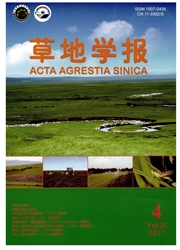

 中文摘要:
中文摘要:
采用小区栽培定期观测法和天然草原无样方采样法,对松嫩平原沙土和盐碱土生境下2个生态型羊草(Leymus chinensis L.)种群营养繁殖规律和天然种群有性生殖特性进行研究,以期揭示羊草种群的繁殖策略及其适应调节信息,为牧草生产实践提供理论基础。结果表明:2个生态型羊草种群的营养生长数量符合y=axb的幂函数增长规律,决定系数均达到极显著水平。b代表种群营养繁殖速率,盐碱土生境灰绿型羊草和黄绿型羊草的繁殖速率均大于沙地的,无论在碱地还是沙地生境,黄绿型羊草的繁殖速率都高于灰绿型羊草。2个生态型羊草生殖分配Ⅰ、穗长和生殖生长比率及其变异系数在盐碱土生境下均高于沙土生境;生殖分配Ⅰ与营养器官重量百分比之间存在显著或极显著负相关关系。因此,生境对2个生态型羊草有性生殖生长的特性产生饰变作用,且与营养生长之间存在对抗关系。
 英文摘要:
英文摘要:
Systems of both vegetative propagation and characteristics of sexual reproduction in two ecotypes Leymus chinensis were studied under sandy soil and salt-alkali soil habitats in Songnen plain using observation in experimental plots and sampling in naturally-meadows.Propagation strategy and adaptation regulation of Leymus chinensis populations were investigated to understand the basics of grazing production.The quantity of vegetative propagation in two ecotypes of Leymus chinensis followed an increasing rule of power function y=axb(b represented a speed of population vegetative propagation).The coefficients of determination had significant differences.The speed-of-population vegetative propagation for two ecotypes of L.chinensis under salt-alkali soil habitat was higher than that under sandy soil habitat.The speed-of-population vegetative propagation for yellow-green ecotypes of L.chinensis was higher than that for grey-green ecotypes under either salt-alkali soil habitat or sandy soil habitat.Reproduction allocationⅠ,length of spike,percentage of reproduction growth and their variation coefficients for two ecotypes were higher under salt-alkali soil habitat than those under sandy soil habitat.There was a significant negative correlation between reproduction allocationⅠ and the percentages of vegetative organ weight.Therefore,habitat had effects on characteristics of sexual reproduction for two ecotypes of L.chinensis and there was negative correlation between sexual reproduction and vegetative growth.
 同期刊论文项目
同期刊论文项目
 同项目期刊论文
同项目期刊论文
 Germination, growth, osmotic adjustment and ionic balance of wheat in response to saline and alkalin
Germination, growth, osmotic adjustment and ionic balance of wheat in response to saline and alkalin β-diversity patterns of plant community in fragmented habitat in a degenerated meadow in Songnen Pla
β-diversity patterns of plant community in fragmented habitat in a degenerated meadow in Songnen Pla Phenotypic plasticity of life history characteristics: quantitative analysis of delayed reproduction
Phenotypic plasticity of life history characteristics: quantitative analysis of delayed reproduction 期刊信息
期刊信息
